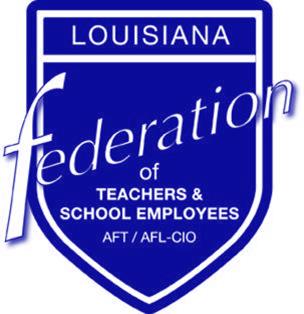Bill would halt teacher arrests for minor offenses
Teachers could no longer be handcuffed and arrested at school for minor offenses if a bill by State Rep. Terry Landry (D-New Iberia) continues its successful path through the legislature.
HB 1108 was introduced at the request of the Louisiana Federation of Teachers after a Baker, Louisiana teacher was arrested at school for allegedly pulling on the shirt tail of a child who refused to follow school policy. The teacher was then subsequently arrested, handcuffed, and taken to jail.
The arrest made front-page news and was featured on television news broadcasts.
Rep. Landry’s bill was given a unanimous vote of approval by the House Criminal Justice Committeeon Wednesday.
“Rep. Landry’s legislation is a win for teachers and law enforcement,” said LFT President Steve Monaghan. “For teachers, it sends a clear message that a simple accusation won’t lead to the embarrassment of arrest. For law enforcement, the bill provides clarifying guidance. We are grateful that Rep Landry has offered this legislation.”
Rep. Landry, a former State Police Trooper, said he hopes no educator will ever have to suffer the same humiliation as the Baker teacher did last March.
“Teachers certainly shouldn’t be arrested for an alleged misdemeanor,” Rep. Landry said. “However, if an arrest happens and then the district attorney decides not to prosecute like what occurred in the recent case, then how does this teacher get her dignity and self-respect back? We need to make sure to make sure this doesn’t happen again.”
The bill requires issuance of a misdemeanor summons “for any misdemeanor act allegedly committed during the course and scope of the school employee’s employment.”
The employee would be required to answer a summons and appear in court on the charges. The bill does not apply to serious offenses or injuries to students.
The bill will be scheduled for a hearing before the full House of Representatives. If it passes the House, it will be sent to the Senate for further action.
Bill requiring elected superintendent proceeds
Fueled by discontent with the performance of State Superintendent of Education John White, two bills that would change the superintendent from an appointive to elective position were approved by the House Education Committee.
HB 127 by Rep. Joe Harrison (R-Gray) is a statute that would require the election of future superintendents; HB 125 by Rep. Harrison is a constitutional amendment that would require a vote of the people to make the superintendent’s job elective.
Passage of an amendment would not allow Governor Bobby Jindal to veto the change, as he would almost certainly do to a statutory change. It was widely noted that White was the governor’s handpicked choice, even though the position is officially selected by the Board of Elementary and Secondary Education.
LFT President Steve Monaghan testified on behalf of the change, saying that elections are “the difference between democracy and oligarchy.”
HB 127 was approved by a 13-4 margin; HB 125 was approved by 9-7.
Kindergarten voucher loophole remains open
The House Education Committee refused to approve a bill that close a loophole which could eventually cause a vast expansion of the state’s voucher program.
Rep. Kevin Pearson (R-Slidell) said that HB 192 is needed to prevent vouchers costs from skyrocketing and preventing the program from aiding the children for whom it was established.
Under current law, children in schools graded “C”, “D” or “F” can get vouchers if their family income is less than 250% of the poverty level. But here’s the loophole: kindergarten-age children who are not already in a school can get vouchers no matter how the school they would attend is rated. And they are allowed to keep vouchers throughout their career, even if their local school has an “A” rating.
Witnesses said that already over one-fourth of the children using vouchers are in K-2 schools because of the loophole.
“One day the state will no longer be able to fund the voucher program,” Rep Pearson said. “We will have kindergarten factories. Kids that need vouchers won’t be able to get them because the money will be gobbled up.”
Only three members supported Rep. Pearson’s bill, and 11 voted against it.
Panel won’t demand certification for charter school teachers
A bill requiring charter schools to adhere to some of the same hiring rules that govern traditional public schools was rejected by the House Education Committee.
HB 124 by Rep. Pat Smith (D-Baton Rouge) would have required charter schools to hire certified teachers if they are available; current law only asks that charter school teachers have at least a bachelor’s degree.
LFT Legislative and Political Director Mary-Patricia Wray said that certification is a sign that a school has high-quality educators, and pointed out that there are numerous ways for potential teachers to earn certification.
The bill was opposed by Superintendent of Education John White, who said that charter schools are progressing nicely without requiring certified teachers. About 72% of teachers in charter schools are certified even though it is not required, White added.
The bill was rejected on a 4-11 vote.
Bill to revamp Baton Rouge schools advances
After more than three hours of often rancorous debate, the Senate Education Committee approved SB 636 by Sen. Bodi White (R-Central), which would grant wide-ranging autonomy to the district’s 88 school principals.
The bill was seen as an extension of Sen. White’s longstanding campaign to allow a section of Baton Rouge to secede and form its own new school system. Dissatisfaction with the parish’s public schools has also led to an effort to create a new city inside East Baton Rouge Parish.
Sen. White’s SB 636 would create new community school councils and give principals greater authority over personnel decisions, as well as contracting for a range of services.
Sen. White said that principals have told him they could “run a better ship” under his bill. But principals and other administrators who spoke at the hearing said they are instructional leaders and should not be expected to also handle contracts for food services, transportation, custodians healthcare and other issues.
LFT President Steve Monaghan said the bill would create at least 14 new jobs for principals who are already charged with improving academic results, and said that “principals are not seeking the solutions offered by SB 636.”
Monaghan also said that, like so many other so-called education reforms, teachers were not consulted as SB 636 was crafted.
“How many bills do I have to see that empower everybody but teachers,” he asked. “They seem to be just spokes in the wheel.”
Senator’s bills deferred by Senate panel
Sen. Dan “Blade” Morrish (R-Jennings) voluntarily deferred two of his education reform proposals before the Senate Education Committee.
SB 179 would provide for more local autonomy in selecting course choice providers and in approving student participation in course choice programs.
SB 191 would require bonus points in the School Performance Score formula to be awarded equally for achievement in Advanced Placement, dual enrollment and International Baccalaureate. Under current BESE regulation, Advanced Placement achievement can earn more bonus points for a school than other alternative pathways.
LFT supported both bills.
Local option textbook selection approved
Without opposition, the House Education Committee approved a bill that would give local school districts more discretion in the selection of textbooks and instructional materials.
HB 988 by Rep. John Schroder (R-Covington) permits local school boards to develop and implement curriculum content and methodology in lieu of that recommended by the State Department of Education and BESE.
House approves student data bill
The House of Representatives gave unanimous approval to a bill aimed at protecting the privacy of public school students.
HB 1076 by Rep. John Schroder (R-Covington) would require the State Department of Education to develop a new system that gives a unique identifying number to public school students by mid-2015, rather than using social security numbers.
New, detailed restrictions would be placed on how student information can be shared and who can access it.
The issue of student privacy is a flashpoint in the larger dispute over Louisiana’s participation in tougher educational standards called the Common Core, particularly how online testing data will be used and shared with outside parties.
The bill will be heard next by the Senate Education Committee.
Panel grills John White on budget issues
The House Appropriations Committee prodded State Superintendent of Education to confess that the state’s $3.5 billion Minimum Foundation Program faces a $55 million shortfall this year.
Questions arose as members asked White why the Department of Education had not provided the enrollment numbers needed to finish budgeting the amount needed for the MFP. White said that about $35 million of the projected shortfall could be attributed to a student enrollment that is higher than estimated, and the governor’s office could explain the rest of the short fall.
The governor’s chief financial officer responded that the issue involves a disagreement between White’s department and the governor’s office about how many students are actually attending public school in the state.
White also told the panel that the proposed 2014-15 MFP will also be about $50 million short of what is needed. Debate has not yet begun on next year’s MFP, which will be in SCR 55 by Sen. Conrad Appel (R-Metairie), chairman of the Senate Education Committee.
Bill that could reduce MFP funding is deferred
A bill that could have made it easier to cut funding for public education stalled when it was voluntarily deferred by its author in the House Appropriations Committee.
HB 587 by Rep. Thomas Carmody (R-Shreveport) is a proposed constitutional amendment that would delete certain provisions with regard to the MFP and other sources of Constitutionally protected funding, including the requirement that the MFP “fully fund” the cost of public education in Louisiana.
Truthfulness in affidavits bill proceeds
An LFT-sponsored bill would give judges more discretion in deciding if administration officials are telling the truth in official documents.
HB 181 by Rep. Randal Gaines (D-LaPlace) and Sen. Bob Kostelka (R-Monroe) would prevent appointed officials from falsely certifying that the grant of an injunction would create a deficit.
The issue was raised in 2012 when the LFT filed suit to overturn Act 2 of 2012, which created Gov. Jindal’s voucher scheme. LFT asked the court to enjoin the state from funding vouchers through the Minimum Foundation Program while a final decision was awaited from the Supreme Court. But because administration officials claimed that enjoining the voucher scheme would create a budget deficit, the judge was powerless to enjoin the program.
Under current law, the truthfulness of an affidavit like the one produced in 2012 cannot be questioned. HB 181 would allow courts to decide if an affidavit is factual.
The bill was approved by the House Civil Law Committee on a 6-3 vote.
“Shall” to “may” change wins bill approval
The change of a single word in a bill aimed at guaranteeing pre-kindergarten program funding eased concerns of the House Education Committee and sent the bill to the full House for a vote.
As originally written, HB 954 by Rep. Walt Leger (D-New Orleans) would have required school districts to hand over 10 percent of any growth money in the LA4 program to qualified private pre-school programs.
School superintendents and school boards opposed the bill, saying that it would strip funding from successful programs. An amendment changed the mandatory “shall” in the bill to a permissive “may,” meaning that school boards will have the option of developing partnerships with qualified private pre-schools if they wish. Once that change was made, the bill sailed past the committee without opposition.
In addition to the funding issue, the bill would 3set up a methodology to determine the demand for per-school services in school districts.
Higher ed retirement bill passes House
A bill that would increase Higher education faculty members of the Teachers’ Retirement System’s optional retirement plan will get an increase in the employer’s share of contributions if HB 6 by Rep. Kevin Pearson (R-Slidell) continues its progress.
Over a four-year phase-in, the bill will increase the employer’s share from 5.5% to 6.2%, which is still lower than the 6.8% contributed by many other schools across the country.
The bill was approved without objection after being amended, and will proceed to the House floor.
House panel okays anti-union retirement bill
HB 45 by Rep. Alan Seabaugh (R-Shreveport) would remove eligibility in the Teachers’ retirement System of Louisiana for future employees of LFT, LAE and a few other educator groups. LFT opposes this bill. It is similar, but not identical, to Rep. Kirk Talbot’s (R-River Ridge) HB25 which has already been approved by this Committee and awaits passage on the House Floor.
HB 45 was approved by a vote of 6-3.
Committee rejects minimum wage bills
Several bills that would have required most Louisiana employers to pay workers a living wage were turned back by the House Labor and Industrial Relations Committee.
The panel first heard HB 356 by Rep. Herbert Dixon (D-Alexandria), who said his goal is for Louisiana to set a “rational minimum wage.” He pointed out that Louisiana does not currently have a mandated minimum wage, and instead defaults to the federal requirement. Rep. Dixon is also chairman of the committee.
Rep. Dixon’s bill would have increased the current $7.25 per hour minimum to $8.25 in 2015, and $9 in 2016. Subsequent increases would be based on the Consumer Price Index.
LFT President Steve Monaghan spoke in favor of the increase, saying that people who work full-time should make a living wage.
“There is real dignity in all work,” Monaghan said. “There is no dignity in working full-time and not being able to feed your family.”
Rep. Dixon’s bill failed in a 6-10 vote split. In short order, three other bills that would have created minimum wages also went down to defeat.
The week ahead
Monday, April 14
Senate Retirement Committee:
Two return-to-work bills will be heard. SB 29 by Sen. Mike Walsworth (R-West Monroe) would allow diagnosticians and reading specialists to return to work without consequence to their retirement benefit. Current law limits the salary of returning retirees to 25% of their retirement benefit. If they make more than that, they must forego their retirement check during the time they are employed.
SB 555 by Sen. Blade Morrish (R-Jennings) would allow any retiree 65 or older to return to work without consequence to their retirement benefit.
LFT supports both of these bills.
House Floor:
HB 322 by Rep. Sam Jones (D-Franklin) would require rulemaking agencies to post information about rule promulgations on their Web site. This is part of LFT’s package.
HB 181 by Rep. Randal Gaines (D-LaPlace) would prevent appointed officials from falsely certifying that the grant of an injunction would create a deficit. This is part of LFT’s package
HB 780 by Rep. Kirk Talbot (R-River Ridge) was previously returned to the calendar after it was amended by to require annual audits of schools participating in the state’s rebate voucher program, a different program than the voucher program funded directly through the state budget. The bill would expand eligibility for this uncapped voucher program. LFT opposes this bill.
Tuesday, April 15
Appropriations Committee:
Testimony on the Department of Education budget will be taken before House Appropriations Committee.
Wednesday, April 16
House Education Committee:
HB89 by Rep. Gregory Miller (R-Norco) would require an identifiable line item within the MFP designated to cover the retirement costs, including payments to the UAL, made by school boards. This bill is supported by LFT since it will better demonstrate the inadequate amount of funds in the MFP, which is meant to “fully fund” the cost of public education.
HB184 by Rep. Kenneth Havard (R-Jackson) would prevent charter schools from leasing property formerly owned by the local school board to other parties. LFT supports this bill.
HB701 by Rep. John Bel Edwards (D-Amite) would remove eligibility in the voucher program for students who attend “C” schools. HB702 by Rep. Edwards would prevent kindergarten students that have access to an A an B school from enrolling in the voucher program. HB703 by Rep. Edwards would prevent BESE from overturning the decision of local school boards that reject charter applications. LFT supports all these bills.
HB836 by Rep. Joe Harrison (R-Gray) would require the Department of Education to create an accountability system for nonpublic schools that makes schools who do not comply ineligible to participate. LFT supports this bill.
HB 867 by Rep. Frank Hoffman (R-West Monroe) would provide an online textbook review processes, and would allow local districts to select their own curriculum. The bill does not provide for a “cycle” on which to purchase textbooks and could lead to disparate prices on the same materials from district to district. LFT is actively working on amendments that would improve this bill.
HB 1177 by Rep. Steve Carter (R-Baton Rouge) is a duplicate of Sen. Bodi White’s(R-Central) SB 636 would alter administrative decision making processes in the state’s largest school districts. LFT opposes this bill. It would allow principals to make personnel, curriculum and management decisions independent of the local school board and superintendent.
Thursday, April 17
House Floor:
HB 1108 by Rep. Terry Landry (D-New Iberia) Landry would prevent unnecessary arrests of teachers for misdemeanor allegations. This is part of LFT’s package




